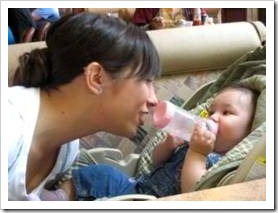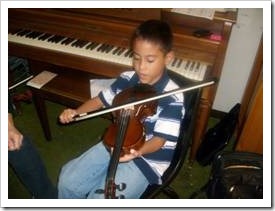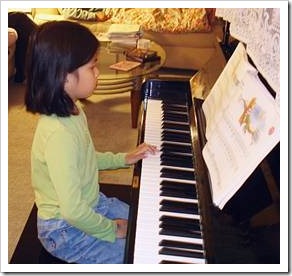
Seems like a promising start, but then she writes, “Here are some things my daughters, Sophia and Louisa, were never allowed to do:
- attend a sleepover
- have a play date
- be in a school play
- complain about not being in a school play
- watch TV or play computer games
- choose their own extracurricular activities
- get any grade less than an A
- not be the No. 1 student in every subject except gym and drama
- play any instrument other than the piano or violin
- not play the piano or violin
… What Chinese parents understand is that nothing is fun until you’re good at it. To get good at anything you have to work, and children on their own never want to work, which is why it is crucial to override their preferences.”
Now, I agree that goal-oriented kids (and grownups) accomplish more, but this is way over the top, especially when some more details of harsh treatment are provided.
If you have been reading this blog for a while, you know Ronit and I have a 22-year-old daughter who excels academically, having finished high school when she was 16. We have a son who is musically gifted, a top student and a school captain, who will be finishing high school when he just turns 16. Our youngest daughter is only 9, but she is well known by her teachers and her friends’ parents as the girl to associate with. She is polite, independent, determined and accomplished academically, as well as in several arts.
Yet, we use very different methods to help our kids grow, because the most important thing for us is their emotional wellbeing.

Now, I have never met Amy’s daughters, but I have met other Chinese kids – our kids go to school with lots of them. Of course, they are not all the same and the term “Chinese” often means “immigrant focused on academic and material success”, but the general profile is an uptight, fear-motivated, passive-aggressive, competitive and often self-loathing child. They play some dorky instrument, like violin or piano, but they listen to pop. They do everything perfectly, but with no spark in their eyes. They can often do things perfectly, but rarely truly well, because they are all head and no heart.
Do you think modern Chinese kids cannot see the difference in the way they are being treated? Sure they can.
Do you seriously believe they are not jealous of the other kids? Sure they are.
Do you really think they have no resentment or feeling of loss and abuse? Sure they do.
During her parenting workshops, Ronit asks the parents to list the things they want for their kids most. The things they list most often are health, love, happiness, friendship, faith, confidence and contentment/satisfaction. Nobody lists money. Nobody lists material success. Apart from health, these are all emotional things!
Ronit then asks the parents to narrow down their list and let go of their least important parenting value (because that is what they have listed). Then, they must do it again and again, until they are left with a single value.

So when you drill your kids to “help” them be better at something – violin, piano, math, English, football or whatever – and you are putting pressure on them, you may be improving their skills in that particular area, but at the same time, you are also
- making them associate that skill/sport/game/subject with pressure and conflict
- positioning yourself as a source of pressure, which means you cannot be trusted to provide emotional support when things are difficult (you will just tell the child to stop whining)
- making your child externally motivated, focused on others’ verbal, written or even implied approval
- making your child ignore anything not being formally measured, like emotional expression, empathy or enjoyment
- making your child doubt their own judgment and preferences
- causing your child’s self-esteem to drop (“I’m no good unless I’m perfect at everything, which is impossible, so I’m no good”)
- The success of migrant children, in my opinion, is not so much the result of continuous pressure from their parents. I believe it is more likely the result of other things:
- Having parents who are good role models for some useful values:
- Independence and unconventional thinking – through living away from their original culture and support structure and making things work
- Determination – through working hard themselves and finding ways to overcome the extra challenges of immigration
- Family, love and sacrifice – through caring enough for their kids to migrate to a better place despite the difficulties
- Education – through investing time and effort choosing the best schools (even if it means relocating), following up and helping
- Speaking a different language – studies have shown that multilingual kids do better than average academically
- Being more open and accepting – kids who grow up in one place believe their way of life is the only one possible, but migrant kids know at least another way of life and are required to adapt all the time
- Playing music – research shows that regardless of their choice of instrument, children who study music consistently increase their academic results (by 23% in 8 years)
One other thing worth mentioning here is that kids have different communication styles and excel at different things. Sadly, some kids can excel at nothing, simply due to their genetic makeup. Using standard ways to measure success is cruel, especially when comparing to other kids. Even if you are a Chinese mother and even if you are very good yourself, the expectation that by applying enough pressure for long enough you can make your child perform is just wrong.
My kids are self-motivated, positive, busy, physically active, social and happy:

- They get applauded for performing in school plays after spending a lot of time rehearsing
- They play harmless computer games and watch filtered TV (mostly Noff)
- They choose their own activities, do well at them and have a ball
- They get B’s in subjects they don’t like and will never pursue, but A’s in anything that matters (to them)
- They are not No. 1 in every subject, but they are very good at what they like, as well as math, English and science
- Eden plays the piano, but she quit as a child and is now paying her own tuition and is very proud of herself. Tsoof plays percussion (does marimba qualify as a piano?) and guitar (it has strings…) and writes music. Noff tried the piano for a while and may go back to it. In the meantime, she sings, dances, skates on ice, draws cartoons and does drama
This weekend, they lost sleep from the excitement of … going back to school.
Yet, Ronit is not a Chinese mother and (ahem) I am certainly not! We believe in creating the environment for your kids to excel and showing them how by example. The rest is up to them, but happy kids always (always) do better.
Are you with me?
Happy parenting,
Gal












